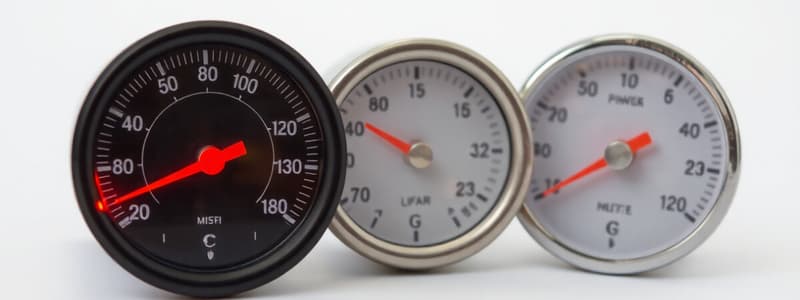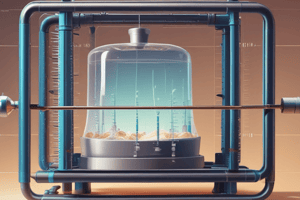Podcast
Questions and Answers
What does temperature fundamentally measure in a substance?
What does temperature fundamentally measure in a substance?
- The volume changes of the substance
- The average kinetic energy of the particles (correct)
- The weight of the particles
- The color of the substance
What happens to the volume of a substance as its temperature increases?
What happens to the volume of a substance as its temperature increases?
- The volume increases (correct)
- The volume decreases
- The volume remains constant
- The volume fluctuates randomly
Which principle is essential for a thermometer to measure temperature accurately?
Which principle is essential for a thermometer to measure temperature accurately?
- Thermal insulation
- Thermal equilibrium (correct)
- Thermal conductivity
- Thermal contraction
Why are liquid-based thermometers now less commonly used?
Why are liquid-based thermometers now less commonly used?
How do engineers address thermal expansion in bridge construction?
How do engineers address thermal expansion in bridge construction?
What is the relation between kinetic energy and temperature in a substance?
What is the relation between kinetic energy and temperature in a substance?
What is the Celsius equivalent of 56 degrees Fahrenheit?
What is the Celsius equivalent of 56 degrees Fahrenheit?
What is the primary purpose of temperature as a concept?
What is the primary purpose of temperature as a concept?
Which statement best differentiates temperature from heat?
Which statement best differentiates temperature from heat?
How does temperature correlate with kinetic energy?
How does temperature correlate with kinetic energy?
What is necessary to change the temperature of an object?
What is necessary to change the temperature of an object?
In the context of temperature, what does the unit Kelvin most commonly pertain to?
In the context of temperature, what does the unit Kelvin most commonly pertain to?
What could be the possible interpretation when someone says "it's cold outside" without further context?
What could be the possible interpretation when someone says "it's cold outside" without further context?
What is equivalent to 4.2 joules of heat in the context of water temperature change?
What is equivalent to 4.2 joules of heat in the context of water temperature change?
Which units can be used to describe temperature?
Which units can be used to describe temperature?
Flashcards
Temperature
Temperature
A quantitative measure of warmth or coldness.
Heat vs Temperature
Heat vs Temperature
Heat is energy; temperature is a measurement of that energy.
Kinetic Energy
Kinetic Energy
Energy of motion; related to the movement of particles.
Measurement Units for Temperature
Measurement Units for Temperature
Signup and view all the flashcards
Celsius
Celsius
Signup and view all the flashcards
Fahrenheit
Fahrenheit
Signup and view all the flashcards
Kelvin
Kelvin
Signup and view all the flashcards
Average Kinetic Energy
Average Kinetic Energy
Signup and view all the flashcards
Thermal Equilibrium
Thermal Equilibrium
Signup and view all the flashcards
Thermal Expansion
Thermal Expansion
Signup and view all the flashcards
Liquid Thermometers
Liquid Thermometers
Signup and view all the flashcards
Thermal Expansion Joints
Thermal Expansion Joints
Signup and view all the flashcards
Temperature Conversion
Temperature Conversion
Signup and view all the flashcards
Study Notes
Temperature Definition
- Temperature describes warmth and coldness quantitatively.
- It's a measure of the average kinetic energy.
- Heat describes the amount of energy, not temperature.
- Different units exist for measuring temperature (Celsius, Fahrenheit, Kelvin).
Temperature Measurement
- Measured using thermometers, which rely on thermal equilibrium.
- When substances touch, heat flows to reach equilibrium.
- Thermometers measure thermal expansion of liquids (e.g., mercury, alcohol).
- Modern thermometers use digital sensors or infrared methods.
- Thermostats use electronic thermometers to maintain desired temperatures.
Temperature and Kinetic Energy
- Temperature reflects the average movement (kinetic energy) of particles.
- Faster particle movement = higher temperature.
- Slower particle movement = lower temperature.
- Changes in temperature affect volume due to particle movement.
Temperature Units and Conversion
- Common units include Celsius, Fahrenheit, and Kelvin.
- Different regions use different standards.
- Conversion equations exist to change between units. (e.g., Fahrenheit to Celsius)
Temperature Examples
- Bridge Construction: Engineers account for thermal expansion by incorporating expansion joints to prevent damage from temperature changes in bridges.
- Unit Conversion Example: 56 degrees Fahrenheit is roughly 13.3 degrees Celsius.
Studying That Suits You
Use AI to generate personalized quizzes and flashcards to suit your learning preferences.




